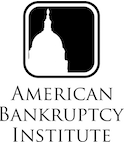Please note that in order to view the content for the
Committee Articles and Announcements
please
log in
if you are already an ABI member, or otherwise you may
Become an ABI Member
Keyword Search: Enter keyword terms, accompanied by optional Boolean connectors
AND
fraud AND damages
Both terms in document
OR
car OR automobile
Either term in document
NOT
infringement NOT patent
Term must not appear in document
""
"due diligence"
Exact match
()
appeal AND (verdict OR judgment)
Exact match
*
withdr*w
Single letter wildcard (withdraw, withdrew)


